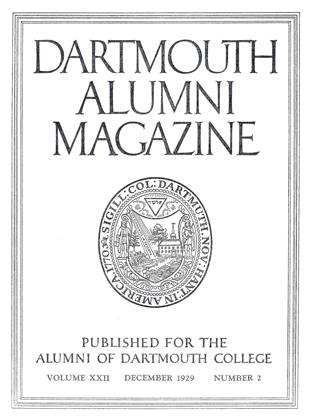Massachusetts State Supervisor of Adult Alien Education
Nobody ever dreamed, not even the 1906 class prophet,that the smallest man in the class of 1906, "Baby" Clark,was in later life to tackle the country's greatest problem.As supervisor of educational work among the more recently arrived adults in Massachusetts, Professor Clarkhas been at work for 10 years trying, and with success, toget the best cultural results out of these people who bring toAmerica samples of the culture of foreign lands, and inorder to stimulate them to give their best to America, loyalcitizenship, proficiency in music or other arts, he has beenorganizing and conducting schools in all the towns andcities of the Commonwealth. He needs no blurb of introduction. His job is worth the telling.
George M. Cohan, in company with some other play-makers of his type, had an unfailing remedy for sick shows, in his earlier days. When one of his innocuous but generally pleasant "dramas" was threatened with anaemia, George would dip his hand into the cornucopia of theatrical medicines and withdraw an American flag. Then with Old Glory in hand, our hero would leap to the footlights at the crucial moment, shouting hurrahs and waving the banner furiously. The audience, forthwith rising in a body, would rock the roof with the mighty volume of their cheers.
Americanization is not flag waving. Let me begin by saying that. Simply stated it is an intelligent effort to promote good citizenship among people of foreign birth. During the war an almost hysterical demand arose for a quick Americanization. As long as this condition lasted genuine accomplishment was hindered. Nevertheless, it served to focus public attention upon the need of assimilating the adult immigrant. Legislation was generally adopted and the work put into the hands of public school authorities to a large extent. Now after some years, we find this program to have become an estab- lished part of most eastern and many western school systems. In Massachusetts the state co-operates with local communities in organizing and conducting classes, reimbursing these cities and towns annually to the extent of virtually 50% of the costs.
Americanization faces the task of penetrating the consciousness of men and women of foreign birth, who have come to the United States lacking a knowledge of the English language and often with little school experience. Attracted to America as the traditional land of opportunity, the strange new tongue presents an immediate and somewhat bewildering barrier to expected progress. The first step then is to equip them with the language.
The whole program of Americanization is based on the proposition that the immigrant is capable of a genuine appreciation of our national ideals. Years of experience with thousands of these men and women have proven the soundness of this belief. It has been our task to bring about first a sympathetic understanding of the traditions, aspirations and customs of the American people. With this understanding has come a full appreciation and a genuine transfer of loyalties. The American language is necessarily the foundation stone.
The man on the street doubtless magnifies the difficulties of the teacher striving to instruct twenty-odd immigrants of several nationalities in the barest fundamentals of English. In truth, the job is not easy but the direct method of teaching simplifies it considerably. For illustration let us select a lesson reading as follows: "I open the door; I pick up the paper; I shut the door; I walk to the chair; etc." Very distinctly the teacher pronounces the first sentence, accompanying it with simple dramatization. Pupils repeat with her both words and motions, thus establishing a direct association between the act, or object, and its English name. This process is repeated, with variations in drill, until the student is able to recognize the word and its corresponding action or object, to repeat these sentences when called upon, and to read them when they are written on the blackboard.
In a little while the lesson becomes, "you walk to the door," and "he walks to the door," and "I walked," and "he will walk," and so on, thereby introducing variants and teaching some of the fundamental necessities in practical language. Other lessons of a similar nature composed of carefully chosen English words with a practical everyday value at the store, on the street, in the factory, in the home and elsewhere, are taught in these early weeks. Gradually, as a certain familiarity with English is obtained, lessons of a more genuine civic interest are introduced. There is, for example, a simple lesson on postal savings, another on quarantine, another on the fire department. Some of the most fundamental facts of Americanism are introduced under a topic such as "What the Flag Stands For." Lessons on safety later occupy the attention of teachers and pupils.
As the work advances through this first year and into the second, facts of elementary economics, geography, history, government, and even literature, are introduced. In the third year pupils have graduated to advanced rank and here follow a carefully prepared course of discussion, reading, and language best fitted to their needs in matters of civic progress.
DRAMATIZING HISTORY HOLYOKE
A TYPICAL EVENING SCHOOL CLASS
 View Full Issue
View Full Issue
More From This Issue
-
 Class Notes
Class NotesCLASS OF 1923
December 1929 By Truman T. Metzel -
 Article
ArticleAlumni Associations
December 1929 -
 Article
ArticleAlumni Council Meets in New York
December 1929 -
 Article
ArticleCarnegie Report
December 1929 -
 Article
ArticleThe Dartmouth Indians
December 1929 By Eric P. Kelly -
 Sports
SportsThe Yale Epic
December 1929 By Phil Sherman









